
Carolyn Young is a business writer who focuses on entrepreneurial concepts and the business formation. She has over 25 years of experience in business roles, and has authored several entrepreneurship textbooks.
David has been writing and learning about business, finance and globalization for a quarter-century, starting with a small New York consulting firm in the 1990s.
Published on January 17, 2022

$210,000 - $500,000 p.a.
$50,000 - $125,000 p.a.
Key considerations to keep in mind when opening your pawn shop:
![]()
Interactive Checklist at your fingertips—begin your pawn shop today!
You May Also Wonder:
How profitable is a pawn shop?
You can make money from interest on loans, and from buying items and selling them at a markup. You can also sell the pawned items if loans with interest are not made on time. You should buy items at a price that you can markup at least 50% to 100%. That part of your business alone can make you a healthy profit.
How can I differentiate my pawn shop from competitors in the market?
Offer unique services like online pawn options or specialized expertise in certain types of items, and provide transparent pricing and fair valuations to differentiate your pawn shop.
Can I start a pawn shop on the side?
Starting a pawn shop on the side is possible, but it requires thorough understanding of local regulations, licensing requirements, and the ability to dedicate time and resources to manage the business effectively.
How to attract new clients to my pawn shop?
Use targeted marketing strategies, such as local advertising, social media promotions, and partnerships with complementary businesses, to attract new clients to your pawn shop.
How can I protect myself against potential fraud or stolen items in my pawn shop?
Implement strict verification procedures, maintain detailed records of transactions, and collaborate with law enforcement agencies to minimize the risk of fraud or dealing with stolen items in your pawn shop.
What types of items can a pawn shop accept as collateral?
Pawn shops can accept a wide range of items as collateral, including jewelry, watches, electronics, musical instruments, firearms, and valuable collectibles. The specific items accepted may vary depending on local laws and the policies of your pawn shop.
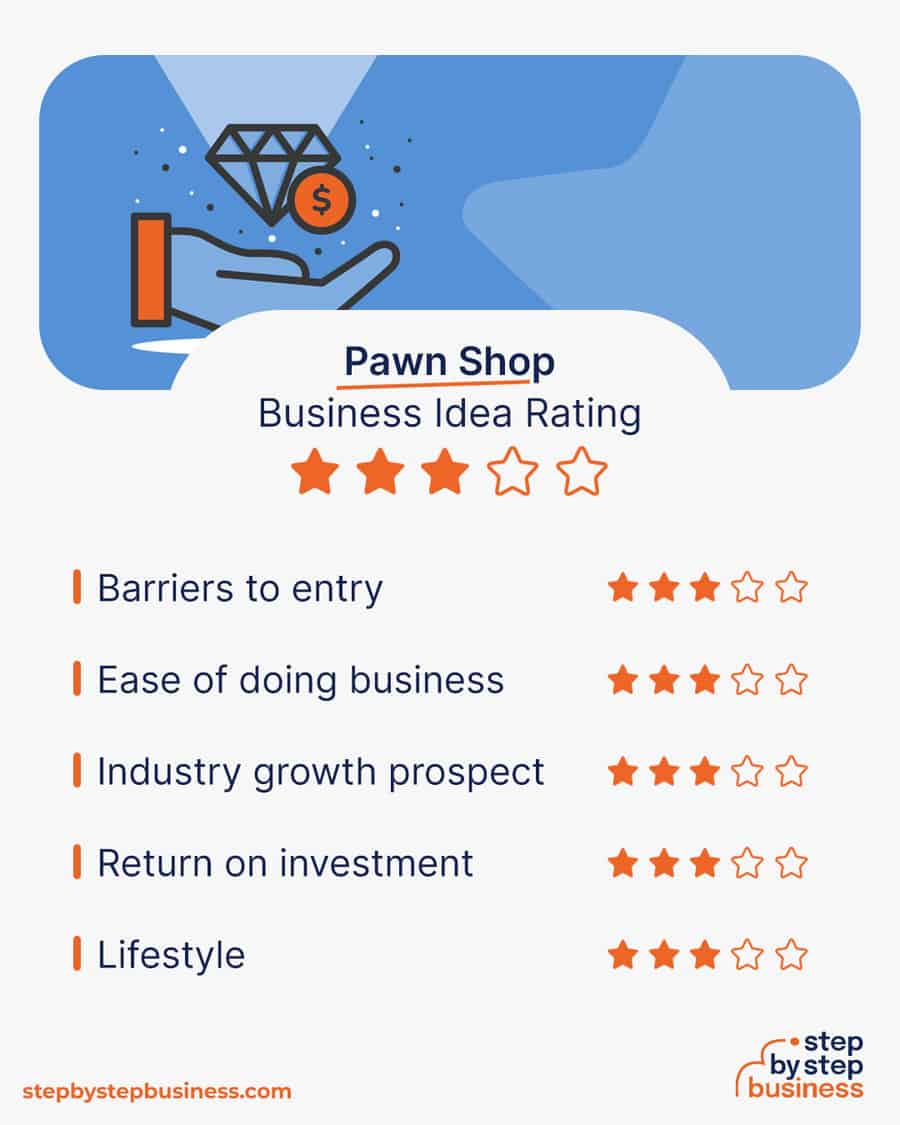
Starting a pawn shop has pros and cons to consider before deciding if it’s right for you.
Pawn shops have mixed consequences during economic downturns. More people pawn or sell their items when they have less income, but they are more likely to default on their loans, and people are less likely to buy items.
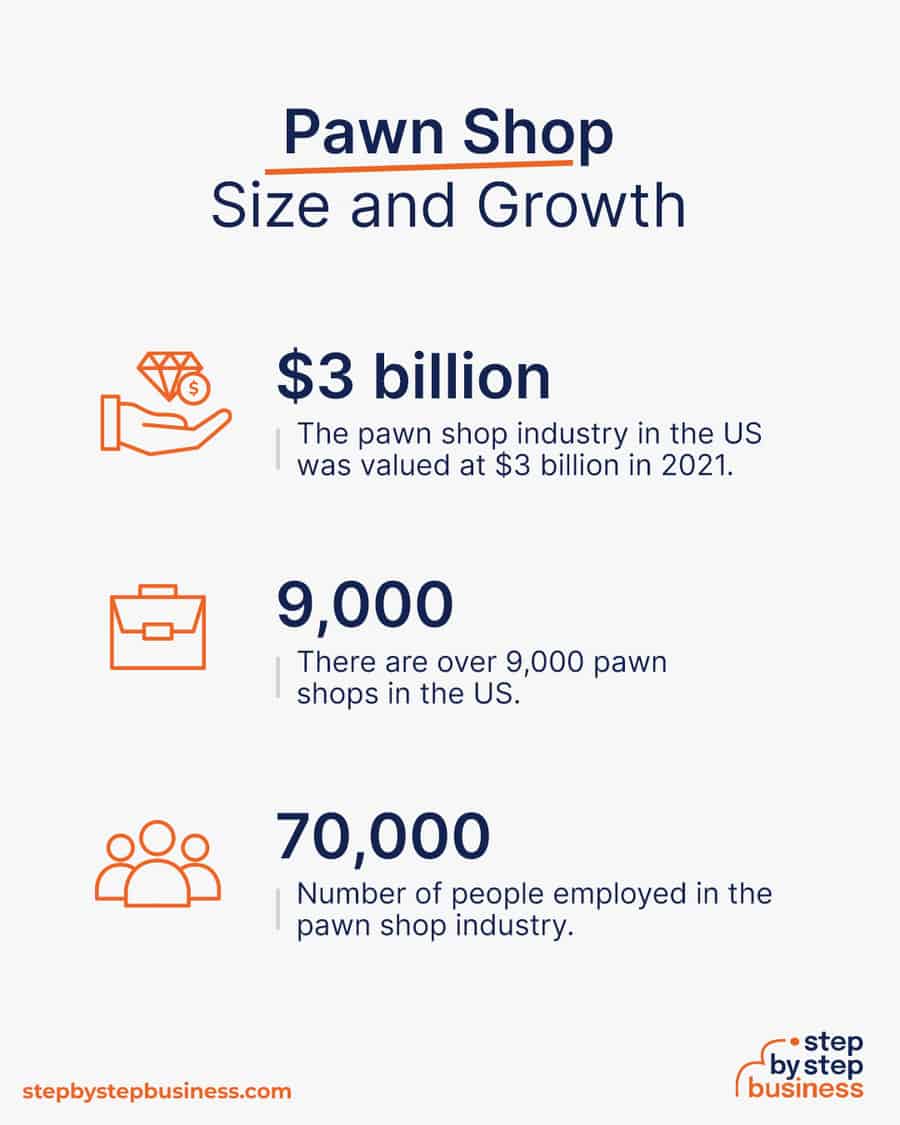
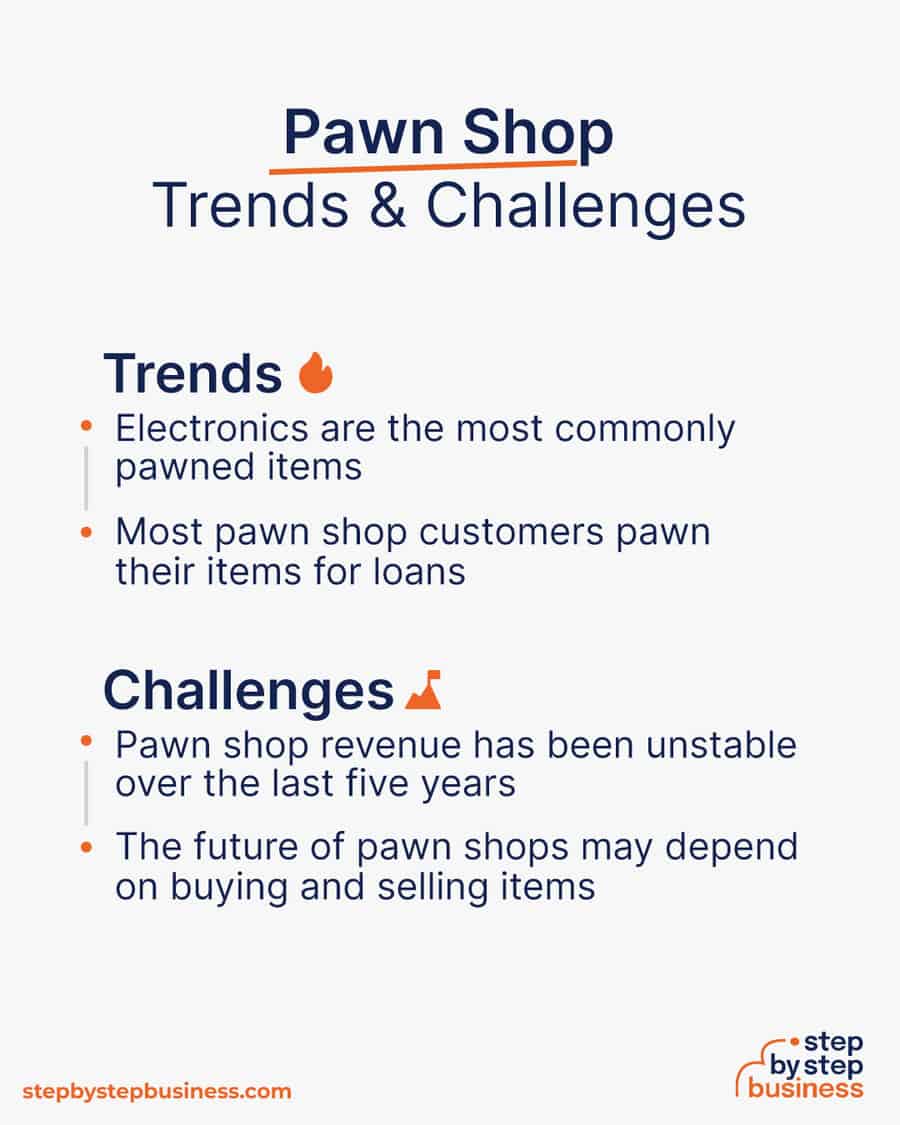
Trends in the industry include:
Some challenges exist in the industry which include:
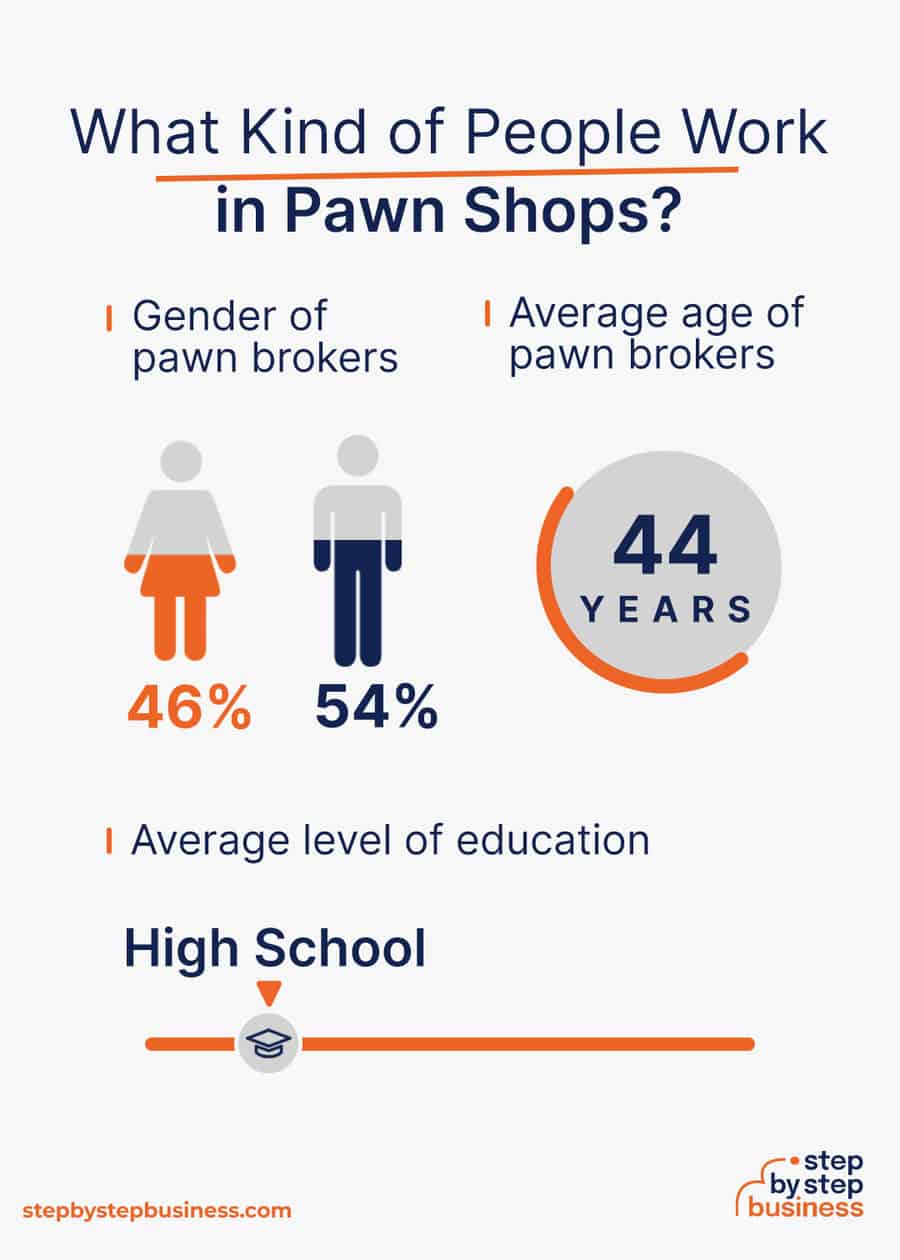
Startup costs for a pawn shop range from about $20,000 to nearly $40,000. The main costs are for a shop rental deposit, shop preparation, and cash to make loans and to purchase items for inventory. Also included is the cost of a pawnbroker’s license.
You’ll need a handful of items to successfully launch your pawn shop business, including:
| Start-up Costs | Ballpark Range | Average |
|---|---|---|
| Setting up a business name and corportation | $150 - $200 | $175 |
| Licenses and permits | $100 - $300 | $200 |
| Insurance | $100 - $300 | $200 |
| Business cards and brochures | $200 - $300 | $250 |
| Website setup | $1,000 - $3,000 | $2,000 |
| Shop rental security deposit | $1,500 - $3,000 | $2,250 |
| Shop preparation with security items like safes and locked cabinets and a computer | $3,000 - $10,000 | $6,500 |
| Pawnbroker license | $800 - $1,500 | $1,150 |
| Cash to make loans and purchases | $5,000 - $20,000 | $12,500 |
| Total | $11,850 - $38,600 | $25,225 |
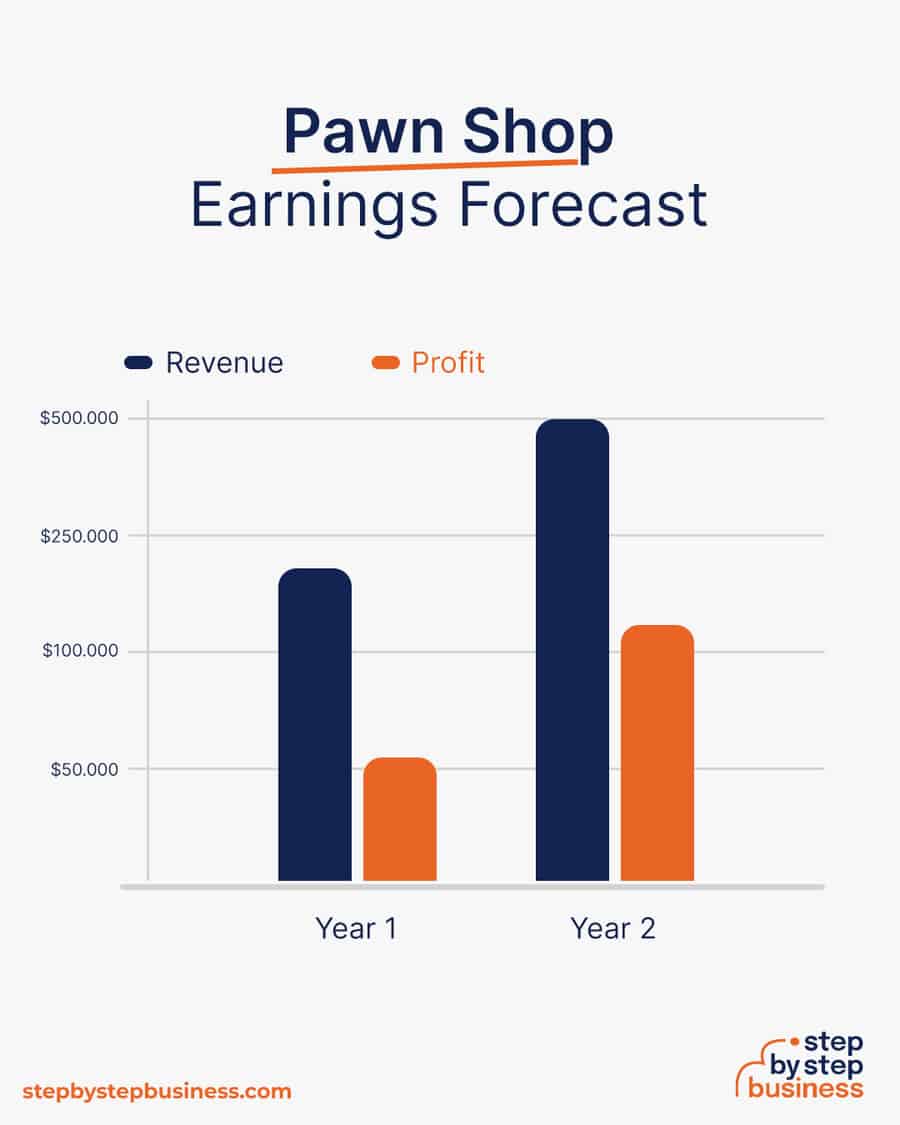
Pawn shop revenue is difficult to predict. The maximum interest rate that you can charge on pawn loans varies by state and could be anywhere from 3% per month to 25% per month. Markups on sold items are generally between 50% and 100%. You should expect a profit margin of about 25% overall. Use our markup calculator to calculate your sale price and how much revenue and profit you will earn with different markup percentages.
In your first year or two if you bring in $2,500 per month in interest and sell $500 worth of items per day, you’ll be bringing in over $210,000 in annual revenue. This would mean over $50,000 in profit, assuming that 25% margin. As your brand gains recognition, you could bring in $10,000 in interest per month and sell $1,000 worth of items per day. With expected annual revenue of nearing $500,000, you would make close to $125,000.
There are a few barriers to entry for a pawn shop. Your biggest challenges will be:
If you’re still not sure whether this business idea is the right choice for you, here are some related business opportunities to help you on your path to entrepreneurial success.
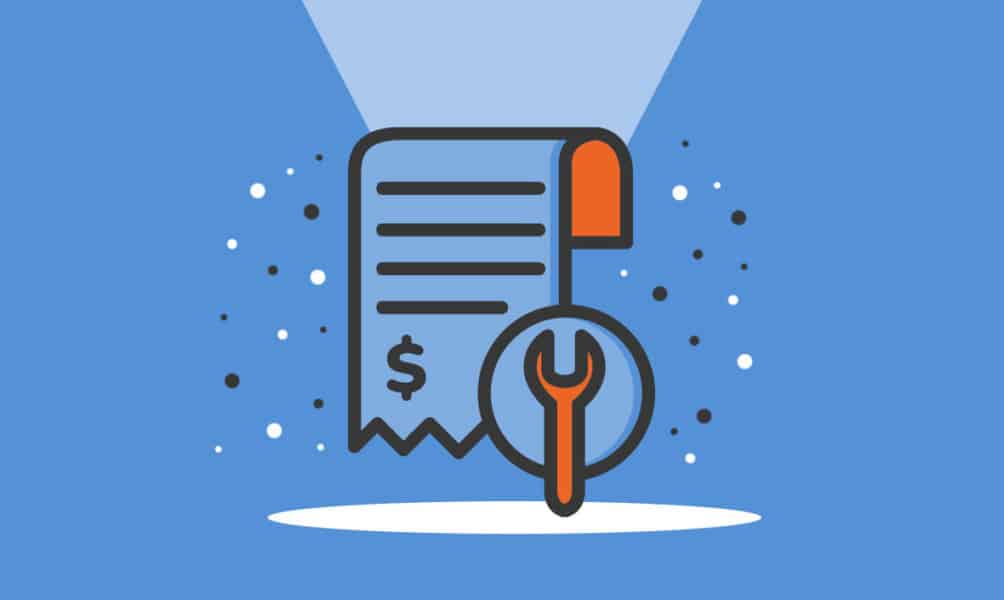
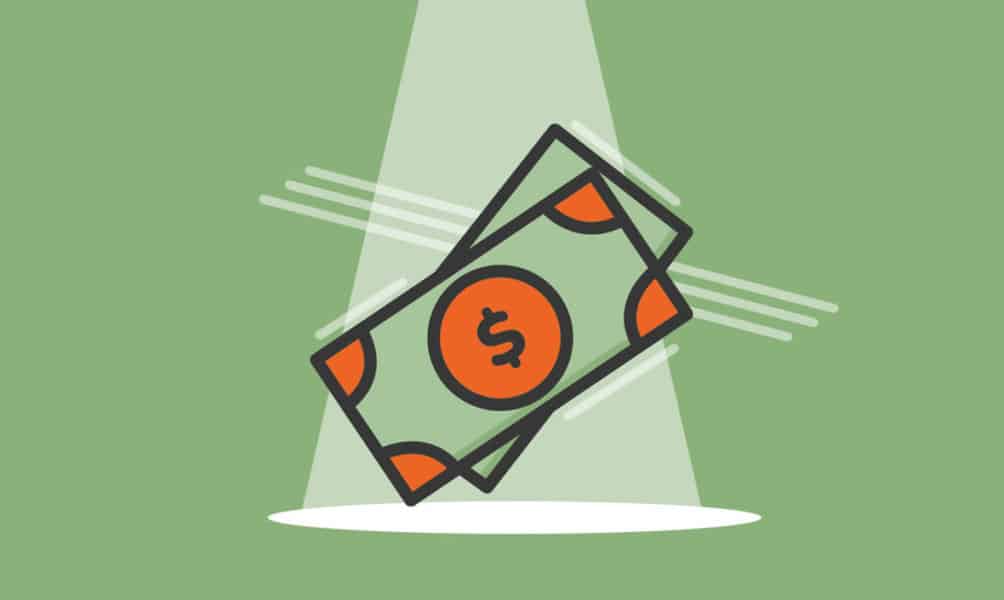
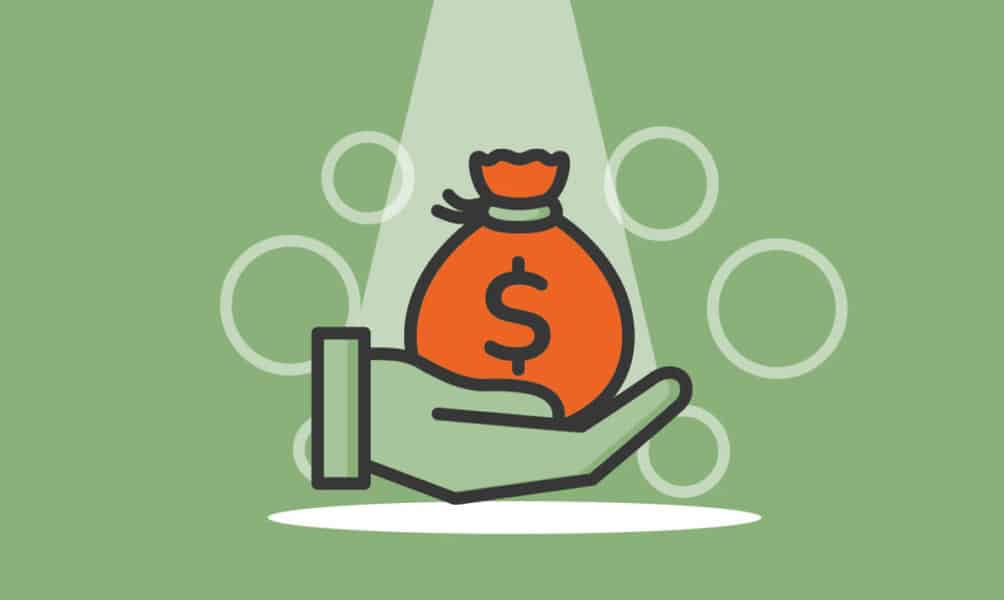
Now that you know what’s involved in starting a pawn shop, it’s a good idea to hone your concept in preparation to enter a competitive market.
Market research will give you the upper hand, even if you’re already positive that you have a perfect product or service. Conducting market research is important, because it can help you understand your customers better, who your competitors are, and your business landscape.
Research pawn shops in your area to examine their products and services, price points, customer reviews, and what sells best. You’re looking for a market gap to fill. For instance, maybe the local market is missing a pawn shop in a certain area.
![]()
You might consider targeting a niche market by specializing in a certain aspect of your industry such as jewelry.
This could jumpstart your word-of-mouth marketing and attract clients right away.
Your products will be based on what people bring to you unless you decide to specialize in a certain item like jewelry.
The interest rate you charge will depend on the maximum allowed by your state. On items that you purchase and sell, you should buy them at prices you can mark up 50% to 100%. You should aim for a profit margin of 25%.
Once you know your costs, you can use this Step By Step profit margin calculator to determine your mark-up and final price point. Remember, the price you use at launch should be subject to change if warranted by the market.
Your target market will be very broad, so you should market yourself on a variety of social media sites including Facebook, Instagram, and TikTok.
The location of your pawn shop is crucial to attracting customers and ensuring its success. Look for a spot in a busy commercial district with high foot traffic, such as a shopping mall or a popular downtown area. Consider accessibility and convenience, ensuring that the location is easily reachable by public transportation and has ample parking.
Depending on the type of pawn shop you plan to start, you may also want to consider the proximity to complementary businesses, such as antique stores or jewelers.
When selecting a location, ensure that it meets all necessary safety and regulatory requirements for pawn shops. By strategically choosing the right location, you can establish a profitable and successful pawn shop that provides high-quality services to customers and stands out in the competitive retail industry.
Find commercial space to rent in your area on sites such as Craigslist, Crexi, and Instant Offices.
Here are some ideas for brainstorming your business name:
Once you’ve got a list of potential names, visit the website of the US Patent and Trademark Office to make sure they are available for registration and check the availability of related domain names using our Domain Name Search tool. Using “.com” or “.org” sharply increases credibility, so it’s best to focus on these.
Powered by GoDaddy.com
Finally, make your choice among the names that pass this screening and go ahead with domain registration and social media account creation. Your business name is one of the key differentiators that sets your business apart. Once you pick your company name, and start with the branding, it is hard to change the business name. Therefore, it’s important to carefully consider your choice before you start a business entity.
Here are the key components of a business plan:

If you’ve never created a business plan before, it can be an intimidating task. You might consider finding and hiring a business plan specialist to create a top-notch business plan for you.
Registering your business is an absolutely crucial step — it’s the prerequisite to paying taxes, raising capital, opening a bank account, and other guideposts on the road to getting a business up and running.
Plus, registration is exciting because it makes the entire process official. Once it’s complete, you’ll have your own business!
Your business location is important because it can affect taxes, legal requirements, and revenue. Most people will register their business in the state where they live, but if you’re planning to expand, you might consider looking elsewhere, as some states could offer real advantages when it comes to pawn shops
If you’re willing to move, you could really maximize your business! Keep in mind, it’s relatively easy to transfer your business to another state.
Business entities come in several varieties, each with its pros and cons. The legal structure you choose for your pawn shop will shape your taxes, personal liability, and business registration requirements, so choose wisely.
Here are the main options:

We recommend that most new business owners choose an LLC as it offers liability protection and pass-through taxation while being simpler to form than a corporation. You can form an LLC in as little as five minutes using an online LLC formation service. They will check that your business name is available before filing, submit your Articles of Organization and be on hand to answer any questions you might have.
Choose Your State
We recommend ZenBusiness as the Best LLC Service for 2024
starts at $0, plus state fees starts at $0, plus state feesThe final step before you’re able to pay taxes is getting an Employer Identification Number, or EIN. You can file for your EIN online or by mail or fax: visit the IRS website to learn more. Keep in mind, if you’ve chosen to be a sole proprietorship you can simply use your social security number as your EIN.
Once you have your EIN, you’ll need to choose your tax year. Financially speaking, your business will operate in a calendar year (January–December) or a fiscal year, a 12-month period that can start in any month. This will determine your tax cycle, while your business structure will determine which taxes you’ll pay.
![]()
The IRS website also offers a tax-payers checklist, and taxes can be filed online.
It is important to consult an accountant or other professional to help you with your taxes to ensure you’re completing them correctly.
Securing financing is your next step and there are plenty of ways to raise capital:

Bank loans or SBA loans are probably the best option for funding a pawn shop business.
Starting a pawn shop business requires obtaining a number of licenses and permits from local, state, and federal governments.
Most states will require you to have a pawnbroker’s license which involves meeting certain educational requirements. States also have specific rules related to pawn shops that you need to be familiar with. Check with your state for requirements.
Federal regulations, licenses, and permits associated with starting your business include doing business as, health license and permit from the Occupational Safety and Health Administration (OSHA), trademarks, copyrights, patents, and other intellectual properties, as well as industry-specific licenses and permits.
You may also need state-level licenses and local county or city-based licenses and permits. The license requirements and how to obtain them vary, so check the websites of your state, city, and county governments or contact the appropriate person to learn more.
You could also check this SBA guide for your state’s requirements, but we recommend using MyCorporation’s Business License Compliance Package. They will research the exact forms you need for your business and state and provide them to ensure you’re fully compliant.
This is not a step to be taken lightly, as failing to comply with legal requirements can result in hefty penalties.
If you feel overwhelmed by this step or don’t know how to begin, it might be a good idea to hire a professional to help you check all the legal boxes.
Before you start making money, you’ll need a place to keep it, and that requires opening a bank account. Keeping your business finances separate from your personal account makes it easy to file taxes and track your company’s income, so it’s worth doing even if you’re running your pawn shop business as a sole proprietorship.
Opening a business bank account is quite simple, and similar to opening a personal one. Most major banks offer accounts tailored for businesses — just inquire at your preferred bank to learn about their rates and features.
Banks vary in terms of offerings, so it’s a good idea to examine your options and select the best plan for you. Once you choose your bank, bring in your EIN (or Social Security Number if you decide on a sole proprietorship), articles of incorporation, and other legal documents and open your new account.
Business insurance is an area that often gets overlooked yet it can be vital to your success as an entrepreneur. Insurance protects you from unexpected events that can have a devastating impact on your business.
Here are some types of insurance to consider:

As opening day nears, prepare for launch by reviewing and improving some key elements of your business.
Being an entrepreneur often means wearing many hats, from marketing to sales to accounting, which can be overwhelming. Fortunately, many websites and digital tools are available to help simplify many business tasks.
You can use industry-specific software, such as PawnMaster, PawnMate, or Bravo, to manage your purchases and sales, inventory, loans, and customers.
Website development is crucial because your site is your online presence and needs to convince prospective clients of your expertise and professionalism.
You can create your own website using services like WordPress, Wix, or Squarespace. This route is very affordable, but figuring out how to build a website can be time-consuming. If you lack tech-savvy, you can hire a web designer or developer to create a custom website for your business.
They are unlikely to find your website, however, unless you follow Search Engine Optimization (SEO) practices. These are steps that help pages rank higher in the results of top search engines like Google.
Here are practical strategies to boost your pawn shop business:

Unique selling propositions, or USPs, are the characteristics of a product or service that sets it apart from the competition. Customers today are inundated with buying options, so you’ll have a real advantage if they are able to quickly grasp how your pawn shop meets their needs or wishes. It’s wise to do all you can to ensure your USPs stand out on your website and in your marketing and promotional materials, stimulating buyer desire.
Global pizza chain Domino’s is renowned for its USP: “Hot pizza in 30 minutes or less, guaranteed.” Signature USPs for your pawn shop business could be:
You may not like to network or use personal connections for business gain. But your personal and professional networks likely offer considerable untapped business potential. Maybe that Facebook friend you met in college is now running a pawn shop business, or a LinkedIn contact of yours is connected to dozens of potential clients. Maybe your cousin or neighbor has been working in pawn shops for years and can offer invaluable insight and industry connections.
The possibilities are endless, so it’s a good idea to review your personal and professional networks and reach out to those with possible links to or interest in pawn shops. You’ll probably generate new customers or find companies with which you could establish a partnership.
If you’re starting out small from a home office, you may not need any employees. But as your business grows, you will likely need workers to fill various roles. Potential positions for a pawn shop business would include:
At some point, you may need to hire all of these positions or simply a few, depending on the size and needs of your business. You might also hire multiple workers for a single role or a single worker for multiple roles, again depending on need.
Free-of-charge methods to recruit employees include posting ads on popular platforms such as LinkedIn, Facebook, or Jobs.com. You might also consider a premium recruitment option, such as advertising on Indeed, Glassdoor, or ZipRecruiter. Further, if you have the resources, you could consider hiring a recruitment agency to help you find talent.
Pawn shops can be big business and are a $3 billion industry in the United States. If you start a pawn shop you can make good money and eventually open multiple locations and have a pawn empire. You’ll never have a dull day in the pawn business either since you’ll never know who or what might be coming in.
Now that you have armed yourself with a load of information, you’re ready to start your entrepreneurial journey to becoming a pawn star!